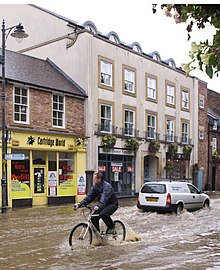
Back Oorstroming Afrikaans Hochwasser ALS ጎርፍ Amharic Inundación AN बाढ ANP فيضان Arabic বানপানী Assamese Enllena AST Daşqın Azerbaijani داشقین AZB

A flood is an overflow of water (or rarely other fluids) that submerges land that is usually dry.[1] In the sense of "flowing water", the word may also be applied to the inflow of the tide. Floods are of significant concern in agriculture, civil engineering and public health. Human changes to the environment often increase the intensity and frequency of flooding. Examples for human changes are land use changes such as deforestation and removal of wetlands, changes in waterway course or flood controls such as with levees. Global environmental issues also influence causes of floods, namely climate change which causes an intensification of the water cycle and sea level rise.[2]: 1517 For example, climate change makes extreme weather events more frequent and stronger.[3] This leads to more intense floods and increased flood risk.[4][5]
The types of floods include areal flooding, riverine flooding, coastal flooding and urban flooding. There is also the intentional flooding of land that would otherwise remain dry. This may take place for agricultural, military, or river-management purposes. For example, agricultural flooding may occur in preparing paddy fields for the growing of semi-aquatic rice in many countries.
Flooding may occur as an overflow of water from water bodies, such as a river, lake, or ocean. In these cases, the water overtops or breaks levees, resulting in some of that water escaping its usual boundaries.[6] Flooding may also occur due to an accumulation of rainwater on saturated ground. This is called an areal flood. The size of a lake or other body of water naturally varies with seasonal changes in precipitation and snow melt. Those changes in size are however not considered a flood unless they flood property or drown domestic animals.
Floods can also occur in rivers when the flow rate exceeds the capacity of the river channel, particularly at bends or meanders in the waterway. Floods often cause damage to homes and businesses if these buildings are in the natural flood plains of rivers. People could avoid riverine flood damage by moving away from rivers. However, people in many countries have traditionally lived and worked by rivers because the land is usually flat and fertile. Also, the rivers provide easy travel and access to commerce and industry.
Flooding can damage property and also lead to secondary impacts. These include in the short term an increased spread of waterborne diseases and vector-bourne disesases, for example those diseases transmitted by mosquitos. Flooding can also lead to long-term displacement of residents.[7] Floods are an area of study of hydrology and hydraulic engineering.
- ^ MSN Encarta Dictionary, Flood Archived 2011-02-04 at the Wayback Machine, Retrieved on 2006-12-28, on 2009-10-31
- ^ Seneviratne, S.I., X. Zhang, M. Adnan, W. Badi, C. Dereczynski, A. Di Luca, S. Ghosh, I. Iskandar, J. Kossin, S. Lewis, F. Otto, I. Pinto, M. Satoh, S.M. Vicente-Serrano, M. Wehner, and B. Zhou, 2021: Chapter 11: Weather and Climate Extreme Events in a Changing Climate. In Climate Change 2021: The Physical Science Basis. Contribution of Working Group I to the Sixth Assessment Report of the Intergovernmental Panel on Climate Change [Masson-Delmotte, V., P. Zhai, A. Pirani, S.L. Connors, C. Péan, S. Berger, N. Caud, Y. Chen, L. Goldfarb, M.I. Gomis, M. Huang, K. Leitzell, E. Lonnoy, J.B.R. Matthews, T.K. Maycock, T. Waterfield, O. Yelekçi, R. Yu, and B. Zhou (eds.)]. Cambridge University Press, Cambridge, United Kingdom and New York, NY, USA, pp. 1513–1766, doi:10.1017/9781009157896.013.
- ^ Attribution of Extreme Weather Events in the Context of Climate Change (Report). Washington, DC: The National Academies Press. 2016. pp. 127–136. doi:10.17226/21852. ISBN 978-0-309-38094-2. Archived from the original on 2022-02-15. Retrieved 2020-02-22.
- ^ Hirabayashi, Yukiko; Mahendran, Roobavannan; Koirala, Sujan; Konoshima, Lisako; Yamazaki, Dai; Watanabe, Satoshi; Kim, Hyungjun; Kanae, Shinjiro (September 2013). "Global flood risk under climate change". Nature Climate Change. 3 (9): 816–821. Bibcode:2013NatCC...3..816H. doi:10.1038/nclimate1911. ISSN 1758-6798.
- ^ "How climate change is making record-breaking floods the new normal". United Nations Environmental Program. 3 March 2020.
- ^ Glossary of Meteorology (June 2000) Flood Archived 2007-08-24 at the Wayback Machine, Retrieved on 2009-01-09
- ^ "WHO | Flooding and communicable diseases fact sheet". WHO. Archived from the original on December 31, 2004. Retrieved 2021-03-28.
© MMXXIII Rich X Search. We shall prevail. All rights reserved. Rich X Search